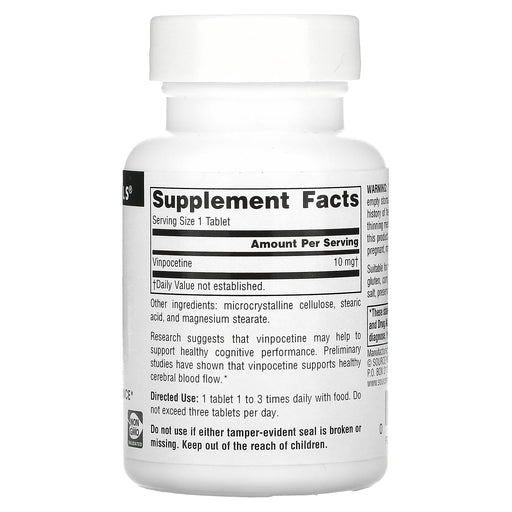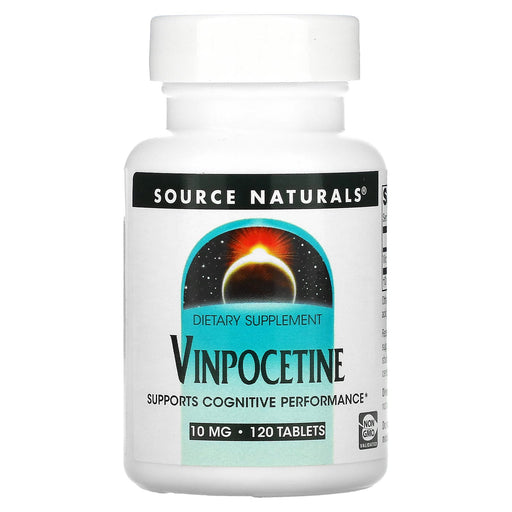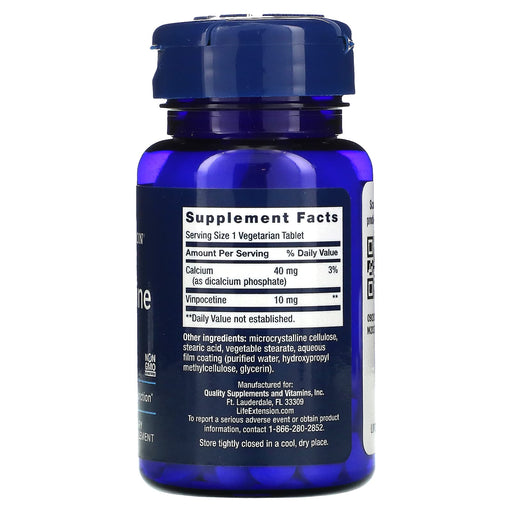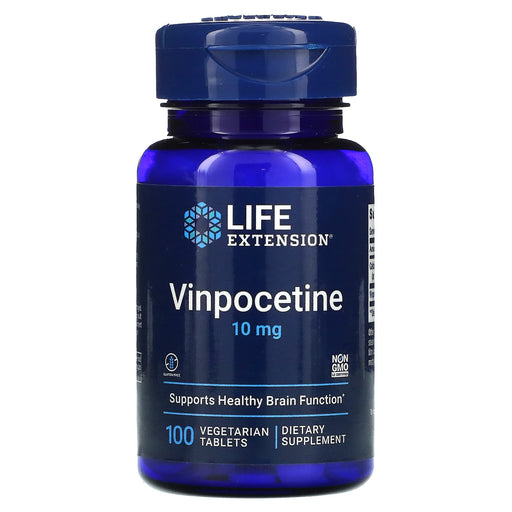
Enhancing Cognitive Function and Brain Health
In the quest for optimal brain health and cognitive performance, Vinpocetine has emerged as a promising natural nootropic. Derived from the periwinkle plant (Vinca minor), Vinpocetine has been extensively studied for its potential to enhance memory, focus, and overall brain function.
Understanding Vinpocetine
Vinpocetine is a synthetic derivative of vincamine, an alkaloid found in the periwinkle plant. It has been used for decades in Europe and Japan as a prescription medication for the treatment of cognitive disorders and cerebrovascular insufficiency.
Vinpocetine is believed to work by increasing blood flow to the brain, enhancing the brain's utilization of oxygen and glucose, and protecting brain cells from oxidative stress and inflammation. By supporting these key aspects of brain health, Vinpocetine may help improve cognitive function, memory, and mental clarity.
The Benefits of Vinpocetine Supplementation
Incorporating Vinpocetine supplements into your brain health regimen may offer several potential benefits, including:
- Enhanced Cognitive Function: Vinpocetine may help improve cognitive performance, particularly in the areas of memory, focus, and mental clarity.
- Increased Cerebral Blood Flow: By dilating blood vessels and reducing blood viscosity, Vinpocetine may help increase blood flow to the brain, providing essential nutrients and oxygen for optimal brain function.
- Neuroprotective Properties: Vinpocetine has been shown to possess anti-inflammatory and antioxidant properties, which may help protect brain cells from oxidative stress and inflammation, supporting long-term brain health.
- Improved Brain Energy Metabolism: Vinpocetine may help enhance the brain's utilization of oxygen and glucose, providing the energy needed for optimal cognitive performance.
- Potential Mood Support: Some studies suggest that Vinpocetine may have a positive effect on mood, possibly by modulating neurotransmitter levels in the brain.
Vinpocetine and Related Vitamins
To further support brain health and cognitive function, consider pairing Vinpocetine with related vitamins and nutrients that work synergistically to optimize brain performance, such as:
- Vitamin B12: This essential vitamin plays a crucial role in nerve function, brain health, and the production of neurotransmitters. Combining Vinpocetine with Vitamin B12 supplements may provide a synergistic effect for optimal cognitive performance.
- Omega-3 Fatty Acids: Omega-3s, particularly EPA and DHA, are essential for brain health, supporting cognitive function, and protecting against age-related cognitive decline. Pairing Vinpocetine with high-quality omega-3 supplements may further enhance its brain-supportive benefits.
- Acetyl-L-Carnitine: This amino acid derivative has been shown to support brain energy metabolism, neurotransmitter production, and cognitive function. Combining Vinpocetine with Acetyl-L-Carnitine may provide a powerful duo for optimal brain health and performance.
Choosing High-Quality Vinpocetine Supplements
When selecting a Vinpocetine supplement, it's essential to choose a high-quality product from a reputable brand. Consider the following factors:
- Optimal Dosage: Look for supplements that provide an effective dosage of Vinpocetine, typically ranging from 10-30mg per serving, taken once or twice daily with meals.
- Purity and Quality: Opt for supplements manufactured in GMP-certified facilities, free from contaminants and fillers, and third-party tested for purity and potency.
- Brand Reputation: Select supplements from trusted brands with a history of producing effective, science-backed cognitive health products.
- Complementary Ingredients: Consider Vinpocetine supplements that include synergistic ingredients like Vitamin B12, Omega-3s, or Acetyl-L-Carnitine for enhanced brain support.
Incorporating Vinpocetine into Your Brain Health Regimen
To maximize the benefits of Vinpocetine supplementation, consider the following tips:
- Follow Dosage Instructions: Always adhere to the recommended dosage on the product label, and consult with a healthcare professional before starting any new supplement regimen, especially if you have pre-existing health conditions or are taking medications.
- Pair with a Brain-Healthy Lifestyle: While Vinpocetine supplements can provide cognitive support, they should be used in conjunction with a brain-healthy lifestyle that includes regular exercise, a balanced diet rich in brain-supportive nutrients, and engaging in mentally stimulating activities.
- Be Patient and Consistent: The benefits of Vinpocetine may be cumulative, so consistent use over several weeks or months may yield the most noticeable improvements in cognitive function and brain health.
Enhance Your Brain Health and Cognitive Performance with Vinpocetine
Ready to take your brain health and cognitive performance to the next level? Explore our collection of premium Vinpocetine supplements and experience the transformative power of this innovative nootropic.
Our Vinpocetine products are carefully formulated with high-quality, pure ingredients and synergistic nutrients to ensure optimal effectiveness. Whether you're looking to enhance memory, sharpen focus, or support long-term brain health, our supplements can help you achieve your cognitive goals.
Start your journey towards optimal brain health and cognitive performance with Vinpocetine. Browse our collection today and experience the potential of this remarkable brain-supportive nutrient.
Frequently Asked Questions about Vinpocetine
1. What is vinpocetine good for?
Vinpocetine is a synthetic compound derived from the periwinkle plant. It is believed to have several potential benefits for brain health and cognitive function. Vinpocetine may help:
- Improve blood flow to the brain, enhancing oxygen and nutrient delivery
- Protect brain cells from damage caused by oxidative stress and inflammation
- Enhance memory, concentration, and overall cognitive performance
- Reduce the risk of age-related cognitive decline and neurodegenerative diseases
- Alleviate symptoms of hearing loss and tinnitus (ringing in the ears)
- Support recovery from stroke and other brain injuries
2. Why is vinpocetine banned in some countries?
Vinpocetine has been banned in some countries, such as Australia and New Zealand, due to concerns about its safety and lack of regulation. In these countries, vinpocetine is considered a prescription drug rather than a dietary supplement. The main reasons for the ban include:
- Potential for adverse side effects, such as lowered blood pressure, headaches, and digestive issues
- Limited research on long-term safety and effectiveness in humans
- Risk of interaction with other medications, such as blood thinners and anticoagulants
- Lack of standardization and quality control in some vinpocetine supplements
In the United States, vinpocetine is still available as a dietary supplement, but the FDA has raised concerns about its safety and has advised manufacturers to avoid using it in their products.
3. How much vinpocetine can I take a day?
The recommended daily dosage of vinpocetine varies depending on the specific product and individual needs. In general, most studies have used doses ranging from 10 to 60 mg per day, divided into two or three smaller doses. However, it is essential to follow the instructions provided by the manufacturer and not exceed the recommended dosage. Taking high doses of vinpocetine may increase the risk of adverse side effects, such as low blood pressure, headaches, and digestive discomfort. It is also important to consult with a healthcare professional before starting vinpocetine, especially if you have pre-existing health conditions or are taking medications.
4. Can vinpocetine raise blood pressure?
No, vinpocetine is not known to raise blood pressure. In fact, one of the potential side effects of vinpocetine is lowered blood pressure. Vinpocetine works by dilating blood vessels and improving blood flow, particularly in the brain. This vasodilatory effect may cause a slight decrease in blood pressure in some individuals. However, the impact of vinpocetine on blood pressure is generally considered mild and transient. If you have a history of low blood pressure or are taking medications that lower blood pressure, it is important to consult with a healthcare professional before taking vinpocetine to avoid any potential negative interactions.
5. What is the best time to take vinpocetine?
The best time to take vinpocetine may depend on the specific reason for taking it and individual preferences. However, in general, it is recommended to take vinpocetine with a meal to reduce the risk of digestive discomfort and to enhance its absorption. Some people may prefer to take vinpocetine in the morning to support cognitive function throughout the day, while others may take it in the evening to promote relaxation and sleep. If taking multiple doses per day, it is best to space them evenly throughout the day. Ultimately, the most appropriate timing will depend on the individual's needs and response to the supplement. It is essential to follow the instructions provided by the manufacturer and consult with a healthcare professional for personalized guidance.
6. How does vinpocetine affect the brain?
Vinpocetine is believed to affect the brain in several ways:
- Increases blood flow: Vinpocetine dilates blood vessels and improves circulation in the brain, enhancing oxygen and nutrient delivery to brain cells.
- Neuroprotection: It protects brain cells from damage caused by oxidative stress, inflammation, and excitotoxicity, potentially reducing the risk of neurodegenerative diseases.
- Neurotransmitter modulation: Vinpocetine may influence the levels and activity of neurotransmitters, such as dopamine and serotonin, which are involved in cognitive function and mood regulation.
- Energy metabolism: It may enhance energy production in brain cells by improving the function of mitochondria, the powerhouses of the cell.
7. Is vinpocetine good for vertigo?
While vinpocetine may have some potential benefits for vertigo, more research is needed to confirm its effectiveness. Vertigo is often caused by issues in the inner ear or vestibular system. Vinpocetine's ability to improve blood flow and reduce inflammation in the brain may help alleviate some of the underlying causes of vertigo. Some studies suggest that vinpocetine may improve symptoms of vestibular disorders, such as Meniere's disease, which can cause vertigo. However, limited scientific evidence specifically supports the use of vinpocetine for vertigo. Consulting with a healthcare professional for an accurate diagnosis and appropriate treatment plan is essential if you are experiencing vertigo












